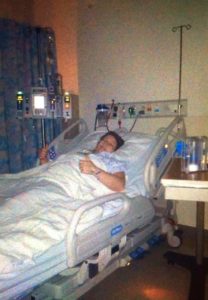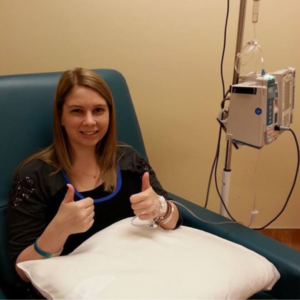I was only 29 years old when I was unexpectedly diagnosed with stage 3 cervical cancer. After a whirlwind few months of surgery, chemotherapy, radiation, and countless other doctor visits, I was fortunate enough to be told that I had no evidence of disease (NED).  That was an amazing feeling, but at the same time, I didn’t realize that the most difficult part of my cancer diagnosis still lay ahead.
That was an amazing feeling, but at the same time, I didn’t realize that the most difficult part of my cancer diagnosis still lay ahead.
When you are undergoing treatment as a cancer patient, there is an end goal. You count down each radiation session, or cross off each chemo treatment off of the calendar. There’s comfort in knowing that the treatments won’t last forever. But when they eventually do end and you go off to live your life, then what? From the time I was diagnosed to the time I was told I was NED was all in the span of only about 6 months. My body had begun to heal from the treatments and surgery, but my brain was struggling to process everything that had just happened. I eventually decided to attend a young adult survivorship group so that I could share my experience with other survivors. I went to the meetings for about 3 years, and while it helped me quite a bit to know that I wasn’t alone in my post-cancer struggles, it still didn’t help as much as I had hoped it would. Nobody else at the meetings had cervical cancer like I’d had. I was never able to fully share my experience with somebody who understood it firsthand.
 Being different is difficult. By looking at me, you’d probably never be able to guess that I was as sick as I actually was. You’d never know that I had an ugly surgery scar on my abdomen. You’d never know that I have 3 little green radiation tattoos that bring back painful memories when I look at them. You’d never know that the treatments affected my body so much that I still struggle with the side effects that will never go away. And, you’d never know that cancer took away my chance to ever have biological children. I am now at an age where a question that I tend to get from people is whether or not I have any children. When I tell them that I don’t, they usually follow up with the question “Well, why not?” It’s in that moment I always have to decide just how in depth I want to go about my situation, and it can be an awkward experience for both of us.
Being different is difficult. By looking at me, you’d probably never be able to guess that I was as sick as I actually was. You’d never know that I had an ugly surgery scar on my abdomen. You’d never know that I have 3 little green radiation tattoos that bring back painful memories when I look at them. You’d never know that the treatments affected my body so much that I still struggle with the side effects that will never go away. And, you’d never know that cancer took away my chance to ever have biological children. I am now at an age where a question that I tend to get from people is whether or not I have any children. When I tell them that I don’t, they usually follow up with the question “Well, why not?” It’s in that moment I always have to decide just how in depth I want to go about my situation, and it can be an awkward experience for both of us.
These are issues I am still struggling to make my peace with today. I am incredibly thankful that my treatments were, and continue to be, successful. However, I still mourn the “normal life” that cancer ripped away from me. I am currently 5 years out from my fight with cancer, and people have been surprised when I’ve told them that life after cancer is difficult. Many people believe that once treatment ends, life goes back to normal and all is well. Not very many people understand the physical and psychological toll that is left for the survivor. For me, the side effects, infertility, and more recently, survivor’s guilt, are all issues that I have to figure out a way to accept and live with, as part of me. It’s a work in progress. At the end of the day, I’m proud and grateful to be able to call myself a cancer survivor and have hope that I will be able to continue to do so.
Sarah Thibodeaux is a 5-year cervical cancer survivor. She lives in Southern California with her family and her dog. She enjoys spoiling her niece and nephew, going to Disneyland, and is an avid Dodger fan.